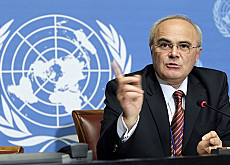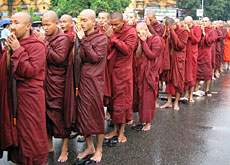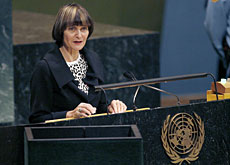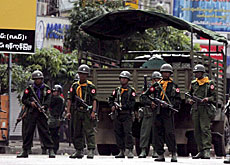Human Rights Council president wants reform

The president of the United Nations Human Rights Council has called for the Geneva-based body to reform, echoing earlier criticism by President Bush.
Doru Costea’s comments came as the Council’s sixth session ended on Friday, against the backdrop of clashes in Myanmar. The Council has planned a special session on Tuesday to discuss the situation in the Southeast Asian nation.
Costea told the Swiss Le Temps newspaper that changes were necessary following the Council’s failure in the Middle East.
Bush had complained during a speech before the UN Plenary Assembly on Tuesday that the Council focused too much attention on Israel and not enough on countries such as Cuba, Venezuela, North Korea and Iran.
“I agree with him. The functioning of the Council must be constantly improved,” Costea told Le Temps on Saturday. He added that the Council must examine the behaviour of all parties involved in complex disputes and not place just one state under the magnifying glass.
The Romanian Ambassador to the UN took up his post at the Council in June – one year after the body was created to replace the old Commission on Human Rights.
However, Costea rejected the idea that the Council should be scrapped and re-started from scratch. “The institution must be tested where it now stands. However, I would be concerned if the Council already had a perfect image,” he said.
Switzerland was among the countries to support a European Union request to hold a special session on Tuesday on the current civil unrest in Myanmar.
Myanmar violence condemned
Several people have been reported killed in clashes with security forces after Buddhist monks started a protest earlier this week against the military dictatorship.
The special session has been welcomed as a signal to the Myanmar government. Peggy Hicks, director of Human Rights Watch, said it sent a clear indication to the Myanmar authorities that the international community does not approve of force against peaceful protests.
The International Federation for Human Rights hoped the session could help the situation getting worse.
The European Union on Friday also voiced its concern at the use of force by the Myanmar authorities. Speaking on behalf of the EU, the Portuguese ambassador to the UN Francisco Xavier Esteves expressed sadness at the lack of restraint shown by security forces in the country.
“We strongly disapprove of the use of force against peaceful demonstrators,” Esteves said, calling on the Myanmar government to open dialogue with its people.
Brussels has not ruled out the use of sanctions if the violence does not stop.
swissinfo with agencies
Swiss Foreign Minister Micheline Calmy-Rey came up with the concept of the Human Rights Council in March 2004 to replace the UN Human Rights Commission created in 1946.
The UN officially accepted the idea in September 2005.
The first session of the UN Human Rights Council took place in June 2006 at its headquarters in Geneva. The Council reports directly to the UN General Assembly.
It consists of 47 member states, which are selected with absolute majority by the UN General Assembly. It meets at least three times a year and can in addition hold special meetings to discuss crisis situations.
The sixth session of the UN Human Rights Council took place from September 10 to 28, 2007.
The Council may summon the UN special envoy for Myanmar, Ibrahim Gambari, to report in December following his current visit to Yangon.
The Council needs approval from a third of its member states to call a special session.
The planned special session on Myanmar would be the fifth such meeting since the Council was formed in June 2006.
Other special meetings have looked into the human rights situation in Lebanon, Darfur and in Gaza.

In compliance with the JTI standards
More: SWI swissinfo.ch certified by the Journalism Trust Initiative



You can find an overview of ongoing debates with our journalists here. Please join us!
If you want to start a conversation about a topic raised in this article or want to report factual errors, email us at english@swissinfo.ch.